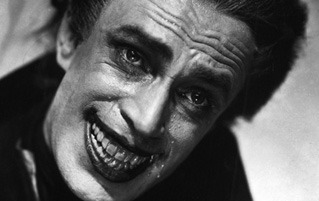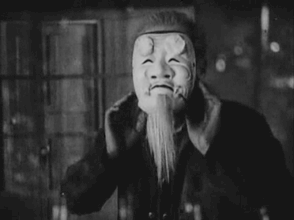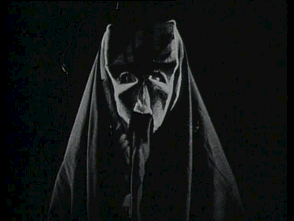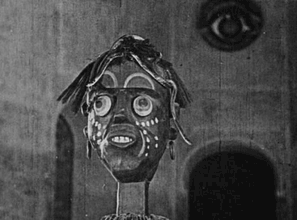9 Terrifying Old Movies That Put Modern Horror To Shame

Don't be fooled by stories about 19th-Century movie audiences losing their shit because they thought that footage of a moving train was going to run them over. Early cinema could get bizarrely hardcore and hardcorely bizarre, even by today's standards. In fact, many of the very earliest films still manage to put modern horror movies to shame. For instance ...
The Execution Of Mary Stuart (1895)

That clip is from freaking 1895 -- when film was brand spanking new and people were amazed by any random shit you could project onto a white sheet. But while most early filmmakers chose to shoot boring real-life events, like people walking or a baby being fed, Thomas Edison wanted to go right for the torture porn. Look, the guy was ahead of his time, okay?

So he hired a director, gathered a bunch of actors, and recreated the 1587 beheading of Mary Stuart from start to uncensored-head-rolling finish (shit, even Game of Thrones cut away before that blade hit Sean Bean's neck). The 18-second film actually features the first trick edit, at the moment when the actress playing Mary is replaced with a mannequin. Normally we wouldn't bother pointing out that a movie didn't actually kill one of its actors, but when you're talking about a movie produced by a guy who was absolutely willing to publicly execute animals in order to sell his inventions, anything is possible.
L'Inferno (1911)

An adaptation of Dante's Divine Comedy, L'Inferno was Italy's earliest feature-length movie. It made use of many pioneering and sanity-noogie-ing special effects, which actually makes a lot of sense for a country that later gave us Salo and Cannibal Holocaust. Mostly set in Hell, the movie is full of shocking-for-the-1910s imagery, such as a decapitated man carrying his own head, the torture of people buried up to their necks in the ground ...

...and demons whipping a bunch of scared naked people.

In the ninth circle of Hell, your safe word means nothing.
Of course, all of those scenes pale in comparison to the final image of a big-ass, three-mouthed Satan sitting on the horizon and munching on the bodies of Brutus and Cassius.


The Man Who Laughs (1928)

Some movies like to save their most shocking scenes for the end. Then again, some movies aren't The Man Who Laughs, which opens with a nobleman being sentenced to death in an iron maiden, while his son Gwynplaine is given surgery to force his face into a grotesque permanent smile. Flash forward to adulthood and Gwynplaine is making a pittance from working in a sideshow as some horrifying proto-Joker.


While we are clearly meant to sympathize with him, it doesn't help that he is smiling maniacally like that for the whole movie.


Oh, and we were serious with that Joker comment -- the comic book character was actually based on this movie's version of Gwynplaine, which itself was based on its director's hatred of his audience's ability to sleep at night.
A Page Of Madness (1926)

A Page of Madness is a 1926 experimental film (co-written by a future Nobel Prize winner) about a janitor whose wife has been committed to an insane asylum for trying to kill their child. It was considered lost for 45 years until we rediscovered it like a bunch of stupid idiots, so now we can all "enjoy" its super creepy ending, in which the janitor realizes that his wife will never get better, has a breakdown, and starts handing out nightmarish "happy" masks to the mental patients.


"Please form an orderly line to receive your knives and chainsaws."
After one of the patients starts dancing, the whole asylum follows, and soon everyone is shaking their moneymakers to whatever messed-up music is playing in their heads. Our guess: the rhythmic screaming of children.


The Peanut Vendor (1933)

The Peanut Vendor is one of the many reminders of why we'd never make it a day in pre-WWII times, when people let children watch Slender Man sing and dance in a cheap Halloween costume and thought nothing of it. The star of this 1930s experimental short is a pipe-cleaner monkey puppet singing along to an up-tempo jazz number and proving that there is no God.


The director Len Lye was said to have based the puppet's movements on his rumba-dancing wife. If that's even remotely true, then it's pretty obvious to us that The Peanut Vendor was less Lye's vanity project and more of a secret cry for help from an army of exorcists.

"THE POWER OF CHRI--"

Belphegor (1927)

"Amadeus? Yo, anyone seen Amadeus around here?"
Despite sharing a name with a prince of Hell and a terrifying metal band, Belphegor is actually a calm, slow-moving thriller about a costumed criminal who pretends to be a phantom haunting the Louvre so he can rob it. It's basically a 1920s version of Scooby-Doo, if it was directed by Darren Aronofsky.
At one time, we see Belphegor sneaking up on the detective investigating him, which is pretty nightmarish on its own, what with his bizarre pharaoh-like face-sack mask. But then the movie gives him a switchblade ...

Finally, when stealth fails, Belphegor fills the room with gas, causing the detective to trip major balls.


This was also Dali's origin story.
In the end, the good guys get the drop on the phantom and try to pull off his mask, but don't really get the answer they're looking for.

Il Caso Valdemar (1936)

Those tears are because you showed him a mirror.
Based on an Edgar Allan Poe story, the 1936 short Il caso Valdemar deals with a man who wants to find out what happens if a dying person is put under hypnosis. (Well, haven't we all wondered that?) Being a charmer, he picks his good pal Valdemar for the experiment, who is dying of tuberculosis. As Valdemar's hours tick away, the hypnotist manages to keep Valdemar in a state of semi-consciousness long enough to ask him a few questions.

Satisfied with the effectiveness of his experiment, the hypnotist tries to bring his buddy back to life. Unfortunately, because this was a pre-WWII product of Italy (the country that gave us triple-faced, naked-dude-chewing Satan), as soon as Valdemar comes out of his hypnotic state, he speed-rots into a skeleton and dies.



Ah! La Barbe! (1906)

Early filmmakers caught on pretty quickly that what people wanted from movies was to see a world of wonder and fantasy that would distract them from their boring, everyday lives. So, long story short, that's why the flamboyant gentleman in the comedy short Ah! La barbe! eats a large dose of shaving cream and starts to hallucinate a series of unspeakable horrors .


As the man busies himself pretending to shave, a series of grinning, disembodied faces appear in his mirror, ending with what looks like Ed Gein wearing the skinned face of Alfred E. Neuman.

"He should have worried."
Understandably, the man then freaks out and smashes the mirror in a fit of junkie rage.

We can't help but wonder how many audiences had tried to do the same by that point.
Au Secours! (1924)

Taylor Swift's acting career has not gone as planned.
In 1924, Abel Gance (who made a 1919 movie about World War I featuring actual footage of battles he was in) made a comedy short called Au Secours! (they were really big on the exclamation marks back then). It was allegedly the result of a wager with fellow director Max Linder, who claimed Gance couldn't make a film in just three days. Gance's response? Put Linder in a film about a man who has to spend an hour in a haunted house to win a bet.
So how does a three-day production in the 1920s make a haunted house look convincing? Step one: snakes everywhere!



Step two: images of fucked-up masks edited into a strobe nightmare.



It's all pretty standard haunted house stuff, right? Towards the end of the bet, Linder's character is quite confident he'll win ... that is until he receives a call from his girlfriend, who tells him that a lumpy-headed pervert has broken into her room and is about to rape her.


Just as Linder hits the panic button to stop the game and go help his girlfriend, it's revealed that she's actually safe, and that all the monsters in the castle were actors hired by the owner to scare Linder and make him lose the bet. Except for the disfigured rapist. He was played personally by the house's owner, for reasons we really don't want to think about right now.
Michael is a video director and editor from the UK. You can check out his work on his website or follow him on Twitter. He also co-hosts a podcast, Champions of the Earth.
For more ways the olden days shame us, check out 6 Movies That Didn't Realize They Let The Villain Win and 7 Songs From Your Grandpa's Day That Would Make Eminem Blush .
Are you on reddit? Check it: We are too! Click on over to our best of Cracked subreddit.
